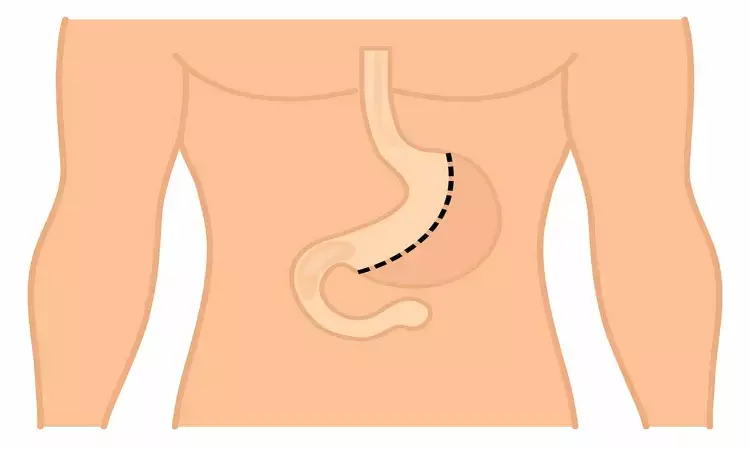- Home
- Medical news & Guidelines
- Anesthesiology
- Cardiology and CTVS
- Critical Care
- Dentistry
- Dermatology
- Diabetes and Endocrinology
- ENT
- Gastroenterology
- Medicine
- Nephrology
- Neurology
- Obstretics-Gynaecology
- Oncology
- Ophthalmology
- Orthopaedics
- Pediatrics-Neonatology
- Psychiatry
- Pulmonology
- Radiology
- Surgery
- Urology
- Laboratory Medicine
- Diet
- Nursing
- Paramedical
- Physiotherapy
- Health news
- Fact Check
- Bone Health Fact Check
- Brain Health Fact Check
- Cancer Related Fact Check
- Child Care Fact Check
- Dental and oral health fact check
- Diabetes and metabolic health fact check
- Diet and Nutrition Fact Check
- Eye and ENT Care Fact Check
- Fitness fact check
- Gut health fact check
- Heart health fact check
- Kidney health fact check
- Medical education fact check
- Men's health fact check
- Respiratory fact check
- Skin and hair care fact check
- Vaccine and Immunization fact check
- Women's health fact check
- AYUSH
- State News
- Andaman and Nicobar Islands
- Andhra Pradesh
- Arunachal Pradesh
- Assam
- Bihar
- Chandigarh
- Chattisgarh
- Dadra and Nagar Haveli
- Daman and Diu
- Delhi
- Goa
- Gujarat
- Haryana
- Himachal Pradesh
- Jammu & Kashmir
- Jharkhand
- Karnataka
- Kerala
- Ladakh
- Lakshadweep
- Madhya Pradesh
- Maharashtra
- Manipur
- Meghalaya
- Mizoram
- Nagaland
- Odisha
- Puducherry
- Punjab
- Rajasthan
- Sikkim
- Tamil Nadu
- Telangana
- Tripura
- Uttar Pradesh
- Uttrakhand
- West Bengal
- Medical Education
- Industry
Add on lidocaine to multimodal analgesia effective for pain relief after Sleeve Gastrectomy

According to a research published in the Journal of PeriAnesthesia Nursing, the addition of intravenous lidocaine to multimodal analgesia reduced acute pain compared with dexmedetomidine and ketamine and lowered hospital length of stay (LOS) in patients who underwent laparoscopic sleeve gastrectomy.
The prospective, randomized, double-blind research investigated the effects of adding ketamine, dexmedetomidine, and lidocaine infusions to multimodal analgesia and evaluated the ensuing pain ratings and analgesic demand in laparoscopic sleeve gastrectomy patients.
Participants were to have laparoscopic sleeve gastrectomy between April 2021 and July 2021 if they were between the ages of 18 and 65 and obese (BMI > 35). Before surgery, the patients were randomly allocated 1:1:1 proportions. Intravenous lidocaine (2 mg/kg lean body weight/h) was administered to patients in group L (mean age, 34.679.68 years; 66.7% women), intravenous ketamine (0.5 mg/kg lean body weight/h) was administered to patients in group K (mean age, 36.0 years; 75.0% women), and intravenous dexmedetomidine (0.5 mcg/kg actual body weight/h) was administered to patients After decreasing the dosage, postoperative infusions continued for 12 hours. Utilizing a visual analog scale, postoperative pain was evaluated (VAS). The main outcome was pain ratings in the first 12 hours after surgery.
VAS rest was lower at all time periods in the first 24 hours in the lidocaine group, whereas VASmovement was lower in the first 6 hours and at 24 hours (P.001, P.001, and P =.008, respectively). The lidocaine group had lower VASrest ratings at 48 hours and VASmovement scores at 12 and 48 hours than the ketamine group (P =.044, P =.001, and P =.011, respectively). At these time periods, there was no statistically significant difference between the lidocaine and dexmedetomidine groups in terms of VASrest and VASmovement ratings (P >.05). On the first postoperative day, the K group required more rescue analgesia than the D and L groups (95 percent CI, 38.5425.52 [27.77-49.32], 14.0020.51 [5.53-22.47], and 6.2515.20 [-0.17 to 12.50] mg; P.001, respectively). Mobilization time was comparable amongst groups (P =.069), and LOS was shorter in the L group compared to the other groups (P =.002). Due to the hospital's inadequate resources, the researchers were unable to quantify the medication concentrations in the blood.
Compared to ketamine and dexmedetomidine, lidocaine as an adjuvant infusion lowers acute discomfort in the early postoperative phase and permits earlier discharge in patients having laparoscopic sleeve gastrectomy. Infusions of dexmedetomidine after a bolus dose and varying dosages of ketamine are required to confirm these findings.
Reference –
Ustun YB, Turunc E, Ozbalci GS, et al. Comparison of ketamine, dexmedetomidine and lidocaine in multimodal analgesia management following sleeve gastrectomy surgery: a randomized double-blind trial. J Perianesth Nurs. Published online April 2, 2022. doi:10.1016/j.jopan.2021.12.012.
MBBS, MD (Anaesthesiology), FNB (Cardiac Anaesthesiology)
Dr Monish Raut is a practicing Cardiac Anesthesiologist. He completed his MBBS at Government Medical College, Nagpur, and pursued his MD in Anesthesiology at BJ Medical College, Pune. Further specializing in Cardiac Anesthesiology, Dr Raut earned his FNB in Cardiac Anesthesiology from Sir Ganga Ram Hospital, Delhi.
Dr Kamal Kant Kohli-MBBS, DTCD- a chest specialist with more than 30 years of practice and a flair for writing clinical articles, Dr Kamal Kant Kohli joined Medical Dialogues as a Chief Editor of Medical News. Besides writing articles, as an editor, he proofreads and verifies all the medical content published on Medical Dialogues including those coming from journals, studies,medical conferences,guidelines etc. Email: drkohli@medicaldialogues.in. Contact no. 011-43720751


